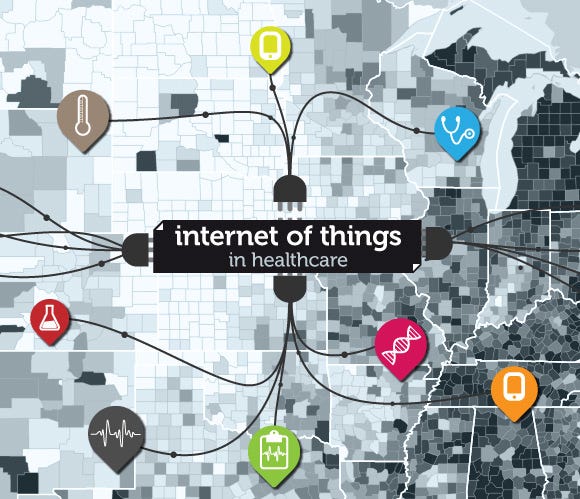February 5, 2014
Information technology has the potential to utterly reshape the practice of medicine, and in many ways, it already has. Still, the rate of transformation has been stubbornly slow, as healthcare costs in many countries have skyrocketed and outcomes have barely budged. Complicating matters is the fact that efforts to tap technology to make healthcare more efficient have often failed. The United States, a leader in terms of medical technology innovation, fares poorly compared to other industrialized nations when it comes to the efficiency of healthcare spending, according to a UCLA report released in December 2013.
|
Image courtesy RazorFish | Healthware |
While few can agree on how to address the healthcare cost crisis in the United States, fewer still understand how technology, from mobile devices to nanotech, is poised to utterly transform healthcare. The change is gradual, but will ultimately be profound. Medicine itself is becoming an information technology, as Google engineering chief Ray Kurzweil has surmised. And as such, medical technology at large--and many of the enabling technologies behind it--will advance at an exponential rate.
Especially promising is the so-called Internet of Things (IoT), which encompasses wearable technology and sensors embedded in just about every physical object imaginable--potentially even humans. Emerging as a star at the 2014 Consumer Electronics Show, the IoT could potentially link everything from your thermostat to your pacemaker to the Internet. Countless sensors, coupled with software, could be used for applications ranging from offering medical advice based on real-time biometric data to automating manufacturing processes--the legal ramifications of the former notwithstanding.
As IoT zealot Kevin Ashton puts it: "The Internet of Things has the potential to change the world, just as the Internet did. Maybe even more so."
If all of this sounds far-fetched, consider that, by 2020, an estimated 50 billion devices will be linked to the Internet. And "by 2050, $1000 worth of computing will have the power of all the human brains on the planet," as Cisco Canada CTO Jim Seifert recently predicted. Imagine all of the applications of that horsepower.
The steadily shrinking costs of computing and sensors could even potentially enable the fourth industrial revolution, an idea popularized by German industry heavyweights Siemens and Bosch as well as the German government. Potentially succeeding the industrial revolution made possible by the steam engine, the assembly line, and computing, respectively, "Industry 4.0" would have manufacturing systems, the supply chain, and actual products on the assembly line communicating with each other. This would enable everything from automating the repair of broken machinery to fine-tuning production according to consumer demand.
While the promises of the IoT border on the hyperbolic, so do its risks. Linking everything to the Internet could translate to obvious and enormous security hazards. Already, the first IoT-related hacking campaign has been carried out, in which more than 100,000 consumer devices were compromised and used as vehicles to send more than 750,000 malicious email messages between December 23, 2013 and January 6, 2014.
More fear-inducing than the prospect of hacking consumer devices such as refrigerators is the hacking of medical devices with potentially lethal results.
Ultimately, there's no way to tell just how profoundly the IoT will reshape our world, but it will reshape it--it already is already attracting serious attention from companies including Cisco, Google, IBM, industrial-automation firm Echelon, and others. Philips CEO has referred to the IoT as a "huge opportunity." The company is already exploring the use of the the technology to link hospitals and homes, and to help serve a greater patient population at a reduced cost. The IoT is not just a theoretical vision any more. It is a reality. As sci-fi author William Gibson as said: "The future is already here--it's just not very evenly distributed."
About the Author(s)
You May Also Like



